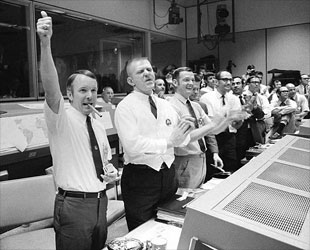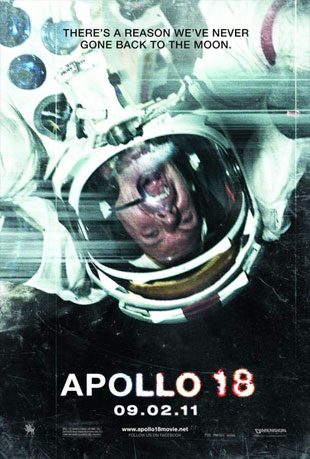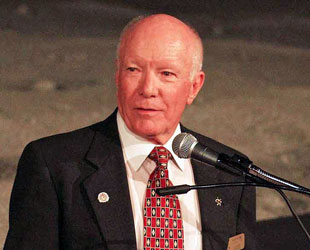September 2, 2011 — Every movie has a director, but for "Apollo 18," opening in theaters today (Sept. 2), a mere film director wasn't enough. To launch the "found footage" from a secret moon landing gone horrifically awry, "Apollo 18" needed a NASA flight director.
Enter Gerry Griffin. During the real Apollo program, Griffin served as lead flight director for the second, fourth and final missions to land men on the moon.
And during Apollo 13 — a flight that received its own, more faithful to history Hollywood treatment (in part due to his serving as technical advisor) — Griffin was set to lead Mission Control through that lunar landing, too. When an oxygen tank explosion called off the landing, he led one of the teams of flight controllers who were responsible for the safe return of the astronauts.

Gerry Griffin (left) and Gene Kranz (center) with other mission controllers celebrating the safe recovery of Apollo 13. (NASA) |
He might have led Apollo 18 as well, had that mission not been canceled on Sept. 2, 1970 — exactly 41 years to day before the release of the film by the same name. But if real life couldn't put Griffin back at the flight director's console, Hollywood could, and did, in "Apollo 18."
Griffin served as technical advisor for the Weinstein Co. film, which seeks to re-write the history that he personally helped create.
collectSPACE spoke with Griffin on Friday, as audiences were getting their first look at "Apollo 18."
How did you first hear about "Apollo 18" and what did you initially think of its premise?
"I first heard about it from a very interesting source, The Science & Entertainment Exchange, which is an office in the National Academy of Sciences. I had never heard of that before, but they evidently have an office so when someone in the entertainment business needs someone who is a scientist or has a technical background to help them with a project, they come to this exchange and from there, they can find people who can help them technically.
"But long story short, I got a call from them and they asked would I be interested in talking to Michele Wolkoff, who is the producer of "Apollo 18." She called me and we chatted for a while and they didn't have a script but they had kind of a broad premise that it would be something about going back to the moon on a flight — obviously fiction — Apollo 18.
"I got a draft script not too long afterwards and saw the basic premise, although it changed a lot. That was back in November of last year, and then the script got changed quite a bit since that. But the basic premise was the same: a mission back to the moon with Apollo hardware, starting out what I would call "normal" and winding up more "paranormal."
"But they were interested in getting the technical look and the technical feel as accurate as they could in the limits of the story."
So how accurate is "Apollo 18" (other than of course the whole government conspiracy, secret mission plot line)?
"Pretty good! I haven't seen the final cut yet but they were pretty darn good. There aren't as many computer graphics — there are some special effects — but it's not an "Apollo 13" or "Deep Impact" or even "Contact" level of computer generated graphics. But it is good.
"The main set, when we're on the moon, was filmed in an old paper recycling factory and the thing was huge. They hauled in I don't know how many truck loads, hundreds, of dirt and rock and they brought in soil and rocks, some of it they made.
"When you see the final cut I think you are going to be surprised at how well they did in one great big building. Some of the distance views that you get of the moon are actually done with a backdrop. It is not a blue screen or green screen, it is actually kind of like a mural. It has a great effect on some of those long shots."
What about the spacecraft and spacesuits?
"I think they got it pretty technically good inside the lunar module mockup and the command module. Pretty darn accurate.
"It was the same lunar module, I think, that was used on "Apollo 13." The command module, I don't know if that was the same one. They did some work on it before we used it — in fact, in both cases — they did a little fixing up and perking up in some areas.
"And they actually built on site in Vancouver the Russian LK [lander]. They did not have any drawings or anything. They had some photos of some mockups. I think one of them is in a Paris museum and one may be in a Russian museum. They literally built what they could see and it turned out very well. It was well done.
"They had some support from folks out of Los Angeles that provided the spacesuits and the crew gear, like the backpacks. And they actually put together locally a lunar rover that looked very good, very accurate, for a mockup that was built by a bunch of movie guys."

"Apollo 18" movie poster (Weinstein Co.) |
How did they simulate lower (or no) gravity?
"In some of the longer shots on the moon, they had a harness that went up real high that had some wires that went inside the suit and then in special effects, they took those out [of the final film], to try to simulate the one-sixth [gravity] feel, particularly as they sort of bounded [about] as they were walking, taking big strides. And that was pretty good.
"But for a lot of the closer work, or what I call the shorter shots, they didn't use the harness, but we tried to get them as good as we could to think one-sixth and move like they were in one-sixth, but that is hard to do.
"Inside the command module, we had a little bit of wire work, but inside the lunar module, we did not because most of those shots, they were actually on the moon and so they were just standing or laying down or sitting.
"I think it was done well enough that it looked authentic. To the untrained eye, to somebody who hasn't watched a lot of people walking around on the moon, they probably won't notice. All the guys who worked at NASA and all the guys that are space buffs will probably notice some areas where that didn't look exactly right, but it is pretty darn good."
Did the actors do well acting like astronauts?
"The crew, the guys who played the astronauts [Warren Christie and Lloyd Owen], worked very hard on trying to get the motions, action, voice, and voice procedures, the radio procedures and that sort of thing, really good. Both the guys were like sponges, they absorbed it.
"And then the third guy [Ryan Robbins] that played in the command module, he came in kind of late in the game, he also did very good on short notice.
"I was proud of those guys. They all did good."

Flight director Gerry Griffin speaking at the 40th anniversary celebration for the Apollo 15 mission in July 2011. (M. Black) |
Speaking of actors playing astronauts, in addition to serving as technical advisor, weren't you also slated to provide voiceover work for Mission Control?
"Well, I was going to but it turned out I couldn't.
"I am a member of SAG [Screen Actors Guild] because of my on-screen appearances in the movies "Contact" and "Deep Impact" and it turned out that this was a non-SAG movie.
"We tried to figure out a way around it but we finally decided it wasn't worth trying to get a waiver, as that is hard to do and it takes a lot of legal eagles.
"But I was in on the auditions for the guys who did do it and they did a good job. They picked it up pretty fast."
Taking a step back from the technical accuracy of the film, do you think "Apollo 18" and movies like it help or hinder getting the public further interested in space exploration and its history?
"Probably, in the long run, it helps and here's the reason why I say that. I think it is great — and NASA can be proud of this, it is something 50 years of spaceflight has done — we've actually weaved into the American, actually the global fabric, the notion that people go into space. I think it is amazing that we now have both fiction and fact that are described in all kind of forms, either in books or movies or television or whatever.
"To me I think the big winner is the fact we now have space as a piece of our art and entertainment and science kind of all wrapped together. There is always going to be film, television or even books that are critically acclaimed and sometimes good and sometimes bad, but that's the nature of the beast.
"I think films like "Apollo 18" help and I don't know how NASA feels about it. Frankly, I wish they would lighten up a bit. It's fiction. I haven't heard anything said bad about it. I've encountered this question before — is it a positive or negative? Well, it's here. It's what the American people are doing. And I think it is great that a good portion of it is space-related."
You mention NASA's feelings about the movie, but to clarify, did the space agency sign-off on "Apollo 18"?
"I think so. Now the reason I say I think so is because that was all done when the movie started. I remember I had to sign some kind of release or something — and I've done it on every film I've worked — where it says you will not use the NASA logo improperly or anything like that. So yes, I know in order to even use the logo they went to NASA so I think that piece of it was done.
"Now whether there was any kind of script review or script sign-off, I don't know. I am not even sure NASA does that, but maybe they do. I think maybe they do just to make sure that there was no — well, for instance — porn or murder or criminal activity, that sort of thing and that would probably be reason not to use the logo or something like that.
"But bottom line, I don't really know all the answers but I know all these people well enough now that I'm sure they did it properly."
Do you think, given the found footage approach of the film, that there will be moviegoers who actually walk out of the theater and believe that Apollo 18 really launched as the film professes?
"Yeah, I think that's probably possible. I still get letters telling me that we didn't go to the moon. Actually, I still get letters about Area 51, which I've never been involved in.
"There's going to be that element out there. I think 99 percent [of moviegoers] will know fact from fiction."
Which would bother you more — that people believe we launched a secret mission and found *something* that had us never return to the moon, or that we never went at all?
"Neither one of them bother me because I know we went because I was a part of it. Those naysayers don't bother me, it's like people thinking the world is flat. I guess it's basically ignorance, and I don't mean that in a demeaning way but they just don't understand.
"And on this thing ["Apollo 18"], if you look at it, (a) you're not going to launch a Saturn V without anybody knowing about it. That's not going to happen.
"And (b), would you fly a classified mission? Yes, we did it on shuttle. We did several of them. We couldn't talk about the payload, we couldn't even talk about what it was. So yes, classified Department of Defense (DoD) missions are certainly possible.
"Now, sending guys up and misleading them by not telling them the whole story? I tried to soften that throughout the movie but it was such a basic piece of the story that we couldn't get it all out, but again that's the fiction.
"So does either bother me? I don't think either of them is serious and I think it's too small a group that would say, yeah, there's fact in there. There is no fact in it."
So for the record, did any of the real Apollo missions that you led or worked on include classified projects?
"None that I'm aware of and I was a flight director on every flight, so no. NASA was and still is completely open as you could be.
"The only time we had to close things down were all these classified shuttle missions but on those flights, we flew all military crews, there were no civilians. They all had the right clearances, they knew what to do. But even those of us on the ground that didn't have to know, didn't. People were briefed in as far as they had to be because it was highly classified stuff. We were the transportation system in that case.
"But in Apollo, no we didn't have any classified DoD stuff going on, at least that I was aware of."
Lastly, it seems the canceled mission Apollo 18 has been the inspiration for a lot of different entertainment projects. Apollo 18 was the flight launched in James Michener's novel-turned-miniseries SPACE, it was the title of an album by They Might Be Giants, and now of course, it's a new film. Apollo 18 was also sometimes used to unofficially describe the U.S. spacecraft that flew the Apollo-Soyuz Test Project in 1976. Which is your favorite?
"Oh gosh! I think I have to say "Apollo 18" the movie because I spent about six months of my life on it. All of them are really neat examples. But I've got a lot of blood, sweat and tears on "Apollo 18" trying to make it as good as it could be."
